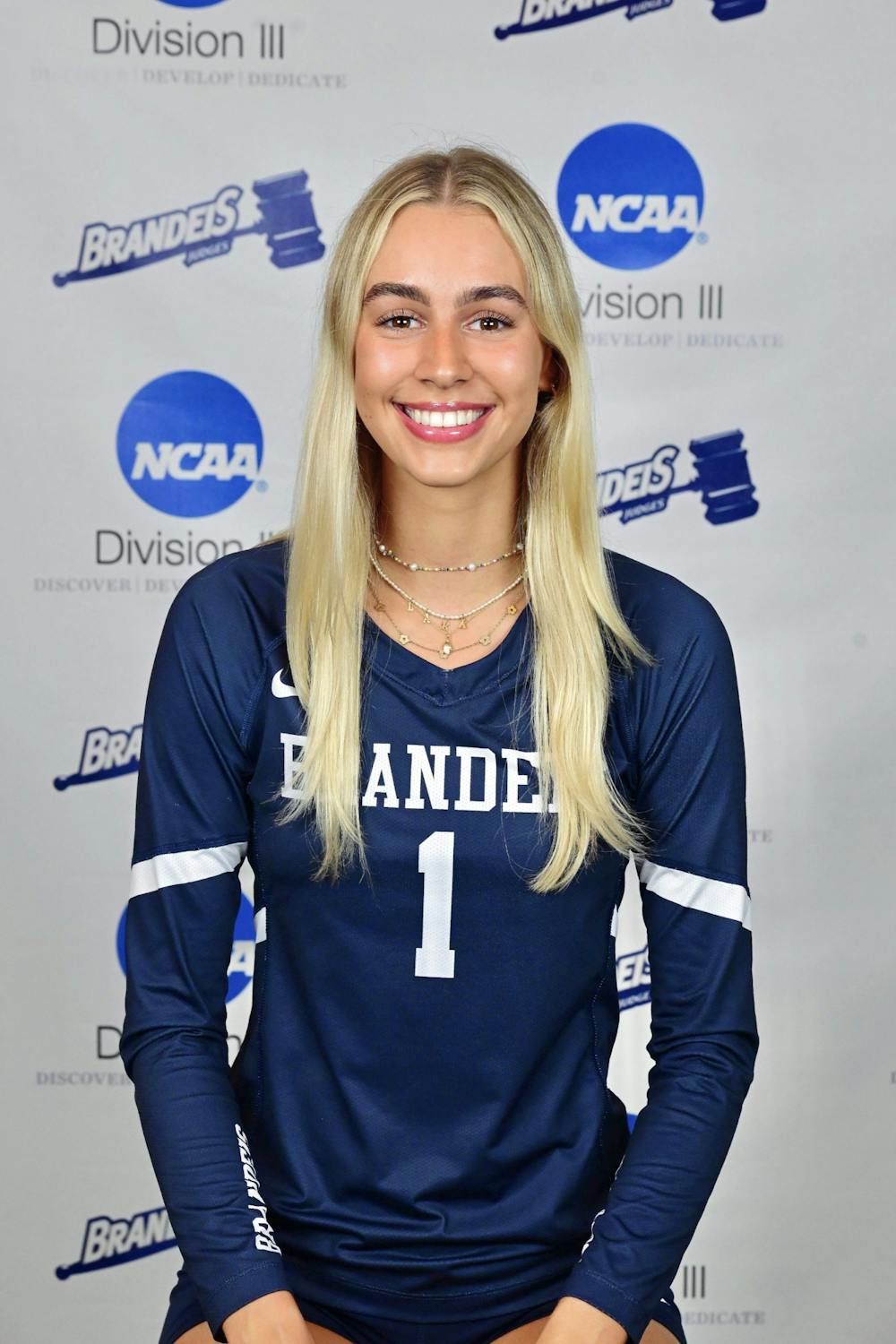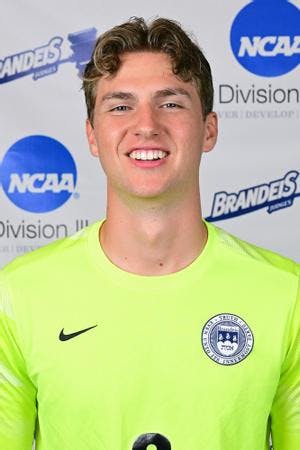UAA ‘Athlete of The Week’ for Oct. 1
Lara Verstovsek ’25, outside hitter on the volleyball team, and Quintin Wrabley ’25, goalie on the men’s soccer team earn UAA “Athlete of the Week” honors during the week ending on Oct. 1

Lara Verstovsek '25
On November 3, 2022, Lara Verstovesk ’25 was on the floor writhing in pain. “[It was] immediately the worst type of pain I've ever felt in my life. I’m on the floor rolling back and forth screaming bloody Mary. Corey [an athletic trainer] runs over. He's grabbing my shoulders trying to stop me from rolling around and I'm grabbing onto him and I'm like, ‘Corey, I can’t do this like I need to pass out, I need to pass out’ because you know when the pain is so bad, like you just need to not be conscious anymore? My coach ran over. She's yelling at me like ‘Look at me like, look at me’ and I looked at her and she was like, ‘You need to take a breath’ because I was hyperventilating. I didn't cry because the pain was unbearable. I knew it was my ACL.”
When Verstovsek started the UAA conference match against New York University in 2022, she was already regarded as the top attacker on the volleyball team, leading by over 20 in kills and ending the previous season with 278 kills — 109 more than the next person on the team. During the second match, she got blocked while trying to get a kill, landing on one foot, and tearing her ACL, forcing her to start the recovery process. She diligently waited the required three weeks before getting surgery, doing what she had to do to get the swelling on her knee down and regain full range of motion to prevent complications.
After getting the surgery at the end of November she was able to stay home and rehab there, as she was previously bedridden in her dorm in East Quad on the fifth floor, unable to fully live her life. Two days after surgery she started physical therapy.
“[It] was really rough because my God, like, it's so crazy how, like, how quickly your leg can deteriorate like that. Like, I … couldn't even lift my leg … I was … working so hard, like you can do this, you can do this. But [the athletic trainers] were just … pushing me to do things that I physically couldn't, like, I couldn't lift my leg onto the table.” An attest to her focus and dedication to the sport, she took rehabilitation just as seriously as she took volleyball. “I really, like, honed in on physical therapy because I knew that and I had seen people who … didn't take physical therapy seriously. They just didn't come back to their sport the way that they wanted to. You know, there are stories of people who, like, don't come back the way they want to, but there are also stories of people who come back the exact way they had left or better and I wanted to be in that ‘or better’ pool.”
Her analytical focus on recovery reflects her play style, according to Emma Smallcomb, the assistant volleyball coach: “In the game, me and her will talk during time-outs or in between points just on specific technical things I want her to shift, and she just really absorbs those and implements them right away.” Praising Verstovsek as “a coach’s dream” and “super fun to coach” she cites Verstovsek’s ability to implement Smallcombs coaching guidance and consistent desire to improve. “She's one of our best defenders as a 6'1'' outside and she just moves really well on the court.”
Verstovsek lives and breathes volleyball, unable to imagine her life without it. “It's definitely a place I can go … if I'm really stressed out or like, I have a lot of anxiety or I'm just feeling overwhelmed and frustrated, I can always go to volleyball as my happy place or my safe place, and I can just tune into that and put all my focus into that.” However, she acknowledged that volleyball “caused [her] a lot of frustration and stress and probably a lot of unnecessary pain,” even citing her ACL. “But in the end, like, I wouldn't change anything. I don't have any regrets or anything like that. If anything, it's made me so much stronger physically.”
Verstovsek started playing sports due to influence from her older brother, who “always had the upper hand” being six years older than her, giving her a drive to also get into sports after seeing he was also heavily involved in sports. She started with a variety including soccer, dance, swimming, basketball, and flag football. She excitedly proclaimed she liked “Anything I could to tackle someone!” She thought she found her specialty in gymnastics after having done it for ten years, but she was growing too tall. In sixth grade, her ‘can do’ attitude and hunger to try as many sports as possible led her to start noncompetitively playing volleyball. The significant height difference between her and everyone else in her class gave her the upper hand giving her the drive to continue playing.
At the beginning of high school she still hadn’t thought about competing in college. It “wasn’t even a thought in my head. It wasn’t going to happen; it was just not a priority.” But when she transferred to a new high school that equally valued the arts, athletics, academics, and religion, she decided she was going to take volleyball more seriously and started playing for a club volleyball team. Despite her change in attitude, this club was very small and underfunded but that “did not change my mindset, but [instead] I learned to deal with negative thoughts and frustrations, especially when your team isn't as good as the other team on the other side of the court.” This experience helped her learn to “be in tune with your thoughts and make sure that you're lifting and supporting other people even when you're down.”
Due to a club coach change during her sophomore year, she switched to a much more competitive club, Houston Skyline, which quickly became her second home. “I would be there like, every day during the summer, at all the clinics, all the camps, all the tournaments, everything.” She knew she wanted to go to a small school because she valued student-professor relationships, cognizant of the fact that close relationships with professors can lead to more opportunities. After visiting the team twice and seeing the academic side of Brandeis and bonding with the volleyball team, she realized the school was the right fit for her.
Verstovsek has had an amazing career as a Judge, earning Brandeis “Athlete of the Week” multiple times as well as earning All-UAA honors, and is on the top ten for best single-season average. Her laundry list of achievements as a Judge has recently gotten longer, earning UAA athlete for the first time for the week ending on Oct. 1. She was shocked when she found out from a fellow teammate and went straight to the Brandeis website for confirmation, where she saw herself and her friend, Quintin Wrabley listed for the week. She was “at a loss for words because the athletes who get UAA player of the week are like amazing athletes.”
She cites her success, as well as her high kill count to her team and coaches, “It's not an individual sport at all and it can quickly become that, especially with statistics and getting all of that stuff in your head. It can become very individualistic very quickly, because obviously … you want to perform as well as you can, but you have to remember every simple thing that you do on the court will affect and influence how the other people will play as well, whether that be the actual skill you do or your emotions and how you handle yourself on the court and how you're handling bad situations or frustrations or stressful events.”
She also mentioned how the team took bonding and communication very seriously and following their game plans even if it may not look pretty in the team statistics, because “if it won't look pretty for you, it will look pretty for the other hitters,” which was something she personally struggled with as the statistics could easily get to one’s head.
Following her recovery, Verstovsek has to wear her brace all season, but she embraces it positively: “I think it looks pretty cool, you know … I got to pick the color — it's white, but it's also pearly glittery. It gets annoying at times because I obviously am sweaty, so … it keeps slipping down. But other than that, it's not that big of a deal.” She has also been honing in on her recovery, working on always landing on two feet and listening to her body which has paid off her once again being a key player to her team. She now leads her team in kills by 43 at 229 and points by 59 at 258, with a kill-per-set ratio of 3.95, having played every set. In the future, Verstovsek plans to go to graduate school to study psychology and has no plans to give up volleyball: “just keep up doing what you love, because once you stop you're not going to be able to perform at such a high level physically. Obviously, when you're 50 you're not gonna be performing how you were when you were 18. But I definitely wanna, like, keep doing it because, I mean, I can't even imagine what life's gonna be like without playing volleyball. So I don't wanna, I don't even step into that path. I'm always gonna have volleyball in my life.” Verstovsek has an exemplary story of how one can come back from injury better and how if you push yourself the possibility to be good is greater.

Quintin Wrabley ’25
Starting as a goalkeeper playing with friends, Quintin Wrabley ’25 didn’t always know he was going to become a collegiate soccer player. Wrabley just became a goalkeeper because his best friend's club team needed a goalkeeper. In his sophomore year, after having a great soccer season and a horrendous basketball season, Wrabley decided to pick soccer and pursue it further as it seemed like the best option. Wrabley stopped playing basketball his junior year and set all of his focus on playing soccer and improving.
Unfortunately, like many high school athletes, Wrabley's season was cut short when COVID-19 hit in March 2020. Even worse for him, it was during the spring of his junior year, which was the bulk of his club season when recruiting for soccer occurs. Luckily when he reached out to the Brandeis soccer team, he fell in love with the coaching and culture, which pushed his decision to come to Brandeis.
Wrabley has had his ups and downs with soccer, including during his time at Brandeis. A major hurdle in his path was that he was unable to play because as a goalie “if you're not starting, you're not playing at all, because it’s unlike every other position, that you come in and out and play like 20 minutes a game. But it's unique in the fact that if you're not starting you're not playing. So my first two years, I played one game, and I backed up Aiden [Guthro ’23] for two years.” The change from playing every game to never getting to play was tough, and because of COVID and the team, but Wrabley persevered, saying, “when I go out for practice, I'm getting better and I'm putting out my full effort there instead of in a game.”
Prior to this semester, he only got to play during one game against Rochester on Oct. 14. 2022, in which he saved 4 shots. His one mistake allowed the other team to score a goal, costing the team the game. This is different from many other positions, where mistakes are typically at least somewhat recoverable because “there's still like 10 people behind them that can help them out.” While he’s not in a position to be as physically involved in the game, he still has to be focused the entire time, as his unique position allows him to see the whole field and relieve pressure off his teammates. This focus is a major requirement because, without it mistakes could occur. These mistakes "tend to be very important because if I make a mistake, most of the time it's gonna be a goal.” Minor moments could be the deciding factor in a game and he’s the last player that can defend his team.
Following his sophomore year and the previous goalie graduating from the team, Wrabley has played every game for the entirety of each game this season. He has made many notable contributions, saving his team from many possible opponent goals. Most recently, Wrabley completed his first clean sheet against a team in the University Athletic Association conference in an Oct. 14 game against the University of Chicago and in the previous game against Babson on Oct. 10 he had a career-high of nine saves.
Wrabley attributes both his and his team's improved performance this year to the team culture: “We've been working harder on the field and, competing more, and since we've been working harder, it's been more fun. So then you wanna work harder. So it's just kind of like a snowballing effect.” Additionally he said “goalkeeper coach Zach Abdu-Glass, [has] helped me grow and improve as a player over my 3 years at Brandeis. My coaches have contributed heavily to my success and without their guidance and motivation I would not be the player I am today.” His positive attitude doesn’t stop there, as he also celebrated his UAA “Player of the Week” ending on Oct. 1 with one of his good friends, Lara Verstovesk ’25. “I think it's fun to see how she's doing well in her sport.” Wrabley stands out not only as a notable player on the men’s soccer team but also for his attitude and sportsmanship.



Please note All comments are eligible for publication in The Justice.